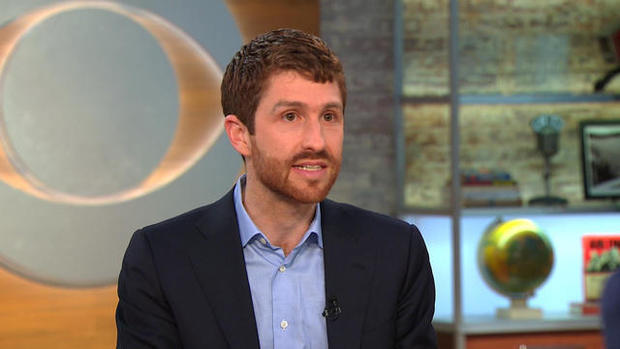Former Silicon Valley insider on how technology is "downgrading humans"
Former Google design ethicist Tristan Harris is sounding the alarm on how technology is "downgrading humans," and he says urgent action is needed to address the dark side of technology.
Harris was among the first Silicon Valley insiders to share his concerns about people's dependence on technology when he spoke with "60 Minutes" in 2017. Now, as co-founder of the Center for Humane Technology, he is pushing for a new agenda for tech companies to change a business model that, he says, preys on our animal brains, at the detriment of our society.
"This is an issue that's bigger than screen time. It's not about addiction," Harris said on "CBS This Morning" Monday. "People are seeing these things as disconnected — 'outragefication' of our politics; teen addiction; mental health issues; social isolation — but these are all connected, because they're all part of a business model of extracting human attention. It's a race to the bottom of the brain stem.
"And that systematically leads to this connected system of downgrading humans. While we're upgrading the machines, we're downgrading humans, downgrading our attention span, downgrading our mental health, downgrading our democracy and our civility, because the business model says outrage works better."
Co-host John Dickerson asked if that's "because outrage works on that part of the brain where you release all the norms and social filters, your animal brain?"
"Exactly. First they go into your animal brain to get your attention, but then they go deeper. We have to get hundreds of millions of people addicted to getting attention from other people. This is how you get the teen issues of mental health, where you have teenage girls who are addicted to getting attention from other people," Harris said.
"Don't the [tech] companies know they're doing that?" asked co-host Gayle King.
"I think they don't like to admit that the business model — our stock price — is directly anchored to how many minutes from your mind I can get from you. It's a direct coupling. We need to de-couple this. This is like moving from the fossil fuel era, where stock prices are directly related to how much we're polluting, to something that's more regenerative. So, we need to move to a 'regenerative attention economy' that doesn't downgrade humans."
Instead of competing for our constant attention, Harris suggested, "they could be competing in a race to the top to help us find common ground, to help people who feel isolated find connections. But they have to move from the business model."
Popular dating apps offer a case in point. "Now all the dating apps, for example, they want to keep you swiping for as long as possible. Imagine they're competing to make it easier to spend time with people and meet people. We can actually make that change happen, especially Apple, by the way, [which] is in the best position to change that, because their business model is not [about] capturing attention."
Compare that to another popular tech feature like GPS, Harris said. "Your GPS isn't meant to suck you into the GPS; the GPS is meant to get you out, back into the world. Imagine a future a human world where the technology is like a GPS and it's getting us back into places. Humans are really good at empathy, we're really good at connection, we have all these evolutionary instincts that work for us. We just need to have technology support that."
Facebook CEO Mark Zuckerberg said recently that he wants Facebook to be "privacy friendly" by giving users ways to communicate in a private, encrypted fashion, and by letting messages automatically disappear.
Co-host Norah O'Donnell asked Harris if he thought that made sense.
He said moving such activity "into the dark" means it can't be tracked. "They're trying to avoid liability," he replied. "I'm sure there's good reasons for doing what they're doing, but when they move all the Russian hacking, pedophilia stuff, all this stuff that's going on in these different groups, when suddenly they're inside a private group, it's not their responsibility. Once it's encrypted, they don't have to be responsible for telling the FBI or whatever, 'We knew this was happening,' because they can't know."
"Doesn't that make it worse?" asked O'Donnell.
"It can. Everything is complicated. They have good reasons for doing what they're doing, but that's a cynical view."
King asked Harris, "Do you think Silicon Valley wishes you would stop talking?"
"I think there's a combination of frustration, but also respect, because this is also laying out facts," he replied. "And everybody knows that everything I've said is true.
"I'm doing this not because I want attention or selling a book or anything like that. This is because It's an urgent existential issue. If we don't tackle these issues, we're going to destroy our common ground, where we can't agree on facts. if we can't agree on facts, you can't do anything, whether it's inequality [or] climate change. We have to have a shared agenda."
See also:




